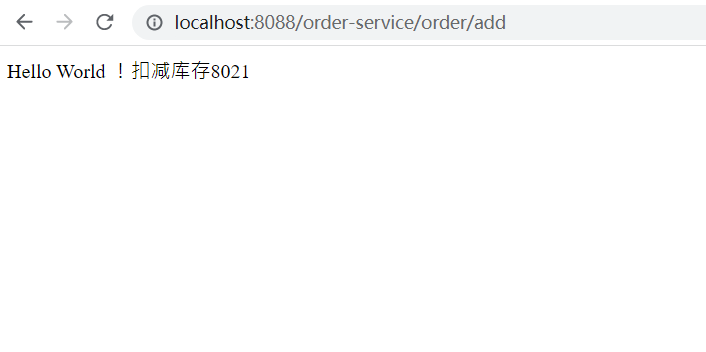What is Spring Cloud Gateway
As the entrance of traffic, the common functions of gateway include routing and forwarding, permission verification, flow restriction, etc.
Spring Cloud Gateway is the second-generation gateway framework officially launched by Spring Cloud, which is positioned to replace Netflix Zuul1.0. Compared with Zuul, Spring Cloud Gateway provides better performance and more powerful functions.
Spring Cloud Gateway is a responsive API gateway implemented by WebFlux + Netty + Reactor. It doesn't work in a traditional servlet container, nor does it build a war package.
Spring Cloud Gateway aims to provide a simple and effective API routing management method for microservice architecture, and provide the basic functions of the gateway based on Filter, such as security authentication, monitoring, current limiting, etc.
1. Other gateway components:
In the spring cloud microservice system, a very important component is the gateway. Zuul gateway is adopted in version 1.x; However, in version 2.x, zuul's upgrade has been skipped. Spring cloud finally developed a gateway to replace zuul, that is, spring cloud gateway
Many places on the Internet say that Zuul is blocked and Gateway is non blocking. This is not rigorous. To be exact, Zuul.x is blocked. In the 2.x version, Zuul is also based on Netty and non blocking. If you have to say performance, there is really no big gap.
On the official website, there was a test project and a benchmark test project was created: spring cloud gateway benchmark, which compared:
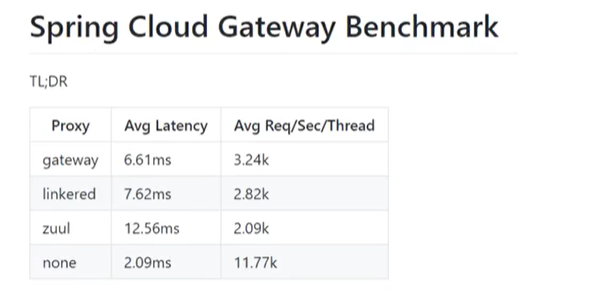
Strong performance: 1.6 times that of Zuul, the first generation gateway
Official website documents: https://docs.spring.io/spring-cloud-gateway/docs/current/reference/html/#gateway-request-predicates-factories
Spring Cloud Gateway features
- Based on Spring Framework 5, Project Reactor and Spring Boot2.0;
- Dynamic routing: it can match any request attribute;
- Support path rewriting;
- Integrate Spring Cloud service discovery function (Nacos, Eruka);
- Integrated flow control degradation function (Sentinel, Hystrix);
- You can specify easy to write predicate and filter for routes;
Core concept
- Route
Routing is the most basic part of the gateway. The routing information consists of an ID, a destination URL, a group of assertion factories and a group of filters. If the assertion is true, the requested URL matches the configured route. - Assertions
The assertion function in Java 8 and the assertion function type in spring cloud gateway are ServerWebExchange in spring 5.0 framework. The assertion function allows developers to define and match any information in Http request, such as request header and parameters. - Filter
Filters in spring cloud gateway are divided into Gateway Filter and Global Filter. Filter can process requests and responses.
working principle
The working principle of Spring Cloud Gateway is similar to that of Zuul. The biggest difference is that there are only pre and post filters in the Gateway.
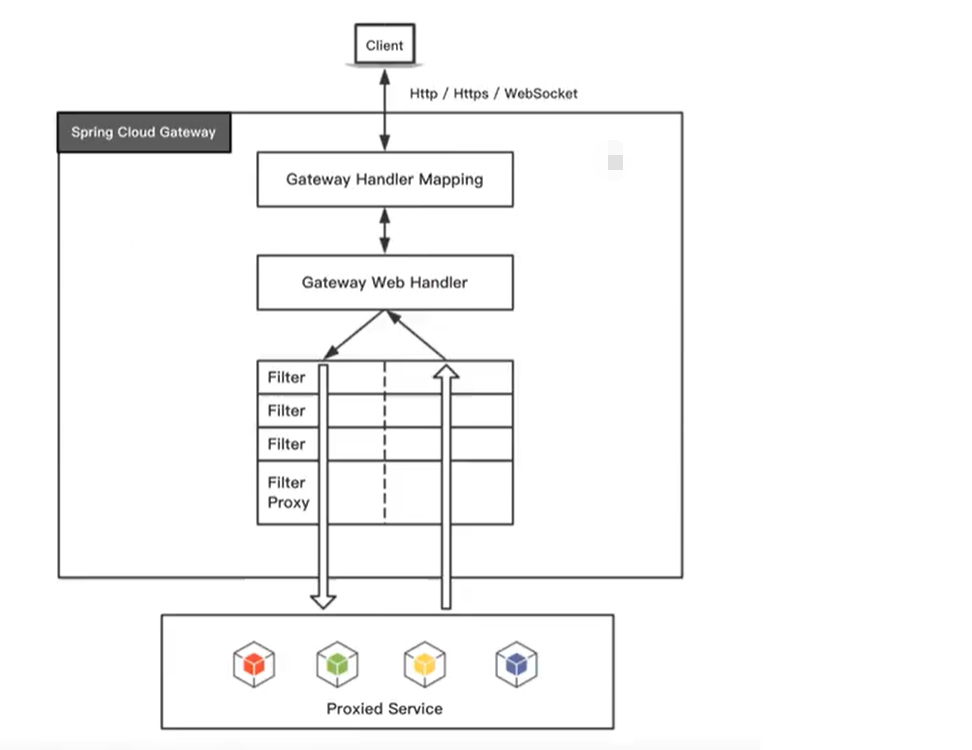
The client sends a request to the Spring Cloud Gateway. If the request matches the route defined by the gateway program, the request will be sent to the gateway Web handler. At this time, the handler runs a specific request filter chain.
The reason why the filters are separated by dashed lines is that the filters may execute logic before and after sending proxy requests. All pre filter logic is executed first, and then the proxy request is executed; After the proxy request is completed, the post filter logic is executed.
Spring Cloud Gateway quick start
1. Environmental construction
1> Introduce dependency
<!--gateway Dependence of spring cloud development-->
<dependency>
<groupId>org.springframework.cloud</groupId>
<artifactId>spring-cloud-starter-gateway</artifactId>
</dependency>
Note: it will conflict with the dependency of spring webmvc, so it is necessary to exclude spring webmvc
2> Writing yml configuration files
server:
port: 8088
# Application name (nacos will take this name as the service name)
spring:
application:
name: api-gateway
cloud:
# gateway configuration
gateway:
# Routing rules
routes:
- id: order_route # Unique identification of the route to order
uri: http://localhost:8020 # address to be forwarded
# Assertion rules are used to match routing rules
predicates:
- Path=/order-serv/**
# http://localhost:8020/order-serv/order/add
filters:
- StripPrefix=1 # Remove the layer 1 path before forwarding
# http://localhost:8020/order/add
#- id: stock_route
3> Testing
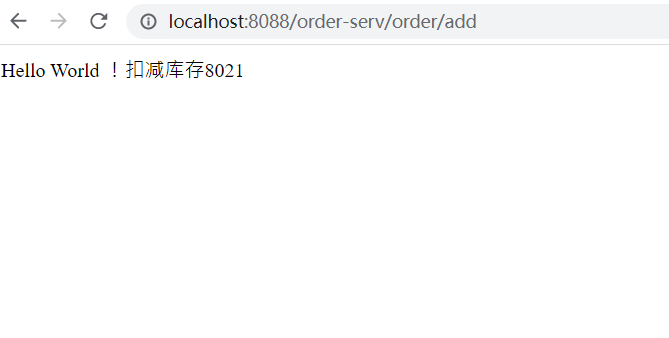
gateway integrates nacos
Now the address of the forwarding path is written in the configuration file. We have analyzed the problems caused by the dead address in person. Next, we get this address from the registry.
1. Introduce dependency
<!--nacos Service registration discovery-->
<dependency>
<groupId>com.alibaba.cloud</groupId>
<artifactId>spring-cloud-starter-alibaba-nacos-discovery</artifactId>
</dependency>
<!--gateway Dependence of spring cloud development-->
<dependency>
<groupId>org.springframework.cloud</groupId>
<artifactId>spring-cloud-starter-gateway</artifactId>
</dependency>
2. Write yml configuration file
server:
port: 8088
# Application name (nacos will take this name as the service name)
spring:
application:
name: api-gateway
cloud:
# gateway configuration
gateway:
# Routing rules
routes:
- id: order_route # Unique identification of the route to order
uri: lb://Order service # address to be forwarded lb: use the local load balancing policy in nacos
# Assertion rules are used to match routing rules
predicates:
- Path=/order-serv/**
# http://localhost:8020/order-serv/order/add
filters:
- StripPrefix=1 # Remove the layer 1 path before forwarding
# http://localhost:8020/order/add
#- id: stock_route
# Configuring nacos
nacos:
server-addr: 127.0.0.1:8848
discovery:
username: nacos
password: nacos
namespace: public
3. Test
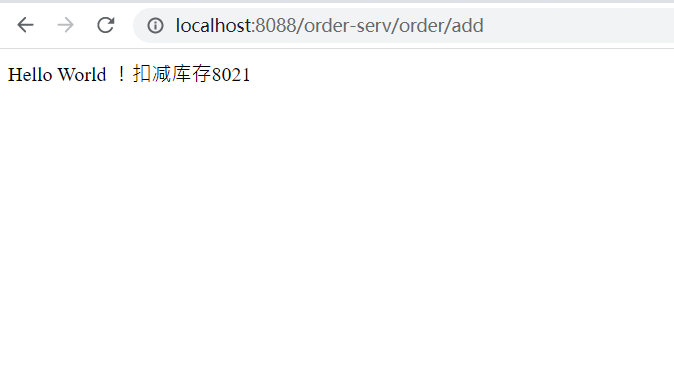
4. Abbreviation: remove the routing configuration and automatically find services
server:
port: 8020
# Application name (nacos will take this name as the service name)
spring:
application:
name: order-service
cloud:
nacos:
server-addr: 127.0.0.1:8848
discovery:
username: nacos
password: nacos
namespace: public
5. Test
